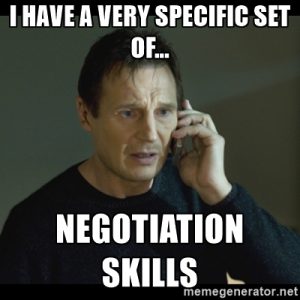I Don’t Know What Your Home is Worth and Neither Does Any Other Agent
Here’s a little known fact: Real estate agents don’t really know what your home is worth. Most will say we do, but we really don’t. We may know a range, but we have no idea what it will actually sell for. Let me explain.
A home is worth what a buyer is willing to pay and what a seller is willing to accept. That’s it. That number may go up or down based on how long it’s been on the market, the demand for the neighborhood, the number of competing homes, how motivated the buyer or seller are, plus about a dozen other variables.
9 Different Negotiations, 9 Different Sales Prices
I recently completed training to become a Certified Negotiation Expert. Our last exercise was to role play a face to face negotiation with another agent. There were 18 of us in the class: 9 were representing a seller and 9 were representing a buyer. Each side knew the details of what their client was willing to accept in terms of price, their level of motivation, what timing they needed, etc. However neither side knew anything about the other side except for what we were able to find out during the negotiation. Each set of agents were put in a private room to negotiate and we had to come out with a signed agreement.
After we were all done, we were brought back in the classroom and the instructor asked if we were all able to come to an agreement and everyone said yes. He then asked us to raise our hand if we believe we negotiated a good deal for our client. All 18 of us raised our hand. He went around the room and asked what the final sales price was for each negotiation.
The asking price for the house was $745,000. The 9 successful negotiations resulted in a sales price from $685,000 to $743,000 and no two negotiations resulted in the same price. That’s a $58,000 spread! Remember, everyone believed that they had negotiated well on behalf of their client, but $58,000 is a pretty significant difference.
You might be thinking there were some pretty poor negotiators in this room (or some really good ones). That may be part of it, but how do you explain 18 productive agents from all backgrounds and years of experience who are highly trained negotiators arriving at vastly different outcomes with the exact same information.
It’s Not All About Price
 Since there was no real buyer and seller, we were essentially negotiating on our own behalf. So why were we all happy with the outcome? Because price is not always the most important factor, that’s just where we tend to focus.
Since there was no real buyer and seller, we were essentially negotiating on our own behalf. So why were we all happy with the outcome? Because price is not always the most important factor, that’s just where we tend to focus.
There were other important variables we were given that I didn’t mention including the sellers needed to sell quickly because they were about to go into foreclosure and they would have been happy selling for $615k. The buyers loved the house, thought it was under priced and were willing to pay full price.
Even with the wide range of negotiated terms, each negotiation was within the acceptable outcomes for both buyer and seller – a win/win scenario.
Here’s the point. Price is one of many variables that determine the value of your home. We as agents can give you a range of a probable sales price, but there’s no way any agent can determine the other variables that may come into the final sales price – no matter what they may tell you.
We Don’t Know What We Don’t Know
When you see a lower than average closed sale in your neighborhood, don’t always assume the seller had a poor negotiator. Perhaps the owners were in escrow on another house at a really good price that they didn’t want to lose and took a lower offer on their current house. Maybe they got a job transfer and the relocation company paid for their closing costs allowing them to sell at a lower price. Perhaps one of the owners just lost their job and they were no longer able to afford the monthly payment and needed a quick sale.
As we learned in the book The Four Agreements: Don’t make assumptions.
And if you see a home set a new high in your neighborhood perhaps the buyers lost out on other homes and didn’t want to risk losing another and willingly offered a higher price. Maybe the seller paid the buyer’s closing costs showing a higher sales price, but a lower actual net price to the seller. Perhaps the buyers had their brother-in-law who sells homes in the bay area negotiate on their behalf and he negotiated as if he was buying a bay area home (it’s a different world up there).
How To Price Your Home
When it’s time to list your home, you have to decide what your true motivation is and what risks you are willing to take to get the terms you want.
Are you ok listing it at the higher end of the range with the hopes that someone is waiting in the wings, but risk sitting on the market for months and becoming “stale”? Are you willing to list it at the low end to hopefully attract multiple offers, but risk leaving money on the table if you priced too low? Or maybe list it somewhere in the middle where both options are a possibility? Perhaps there are other terms that are more important to you than price like a quick sale.
We as agents can advise you, but ultimately you have to assess what your needs are and what your risk tolerance is and make the decision that will most likely lead to the best outcome for your unique situation.
So when we sit down to discuss the value of your home, we’ll discuss the recent sales and the mood of the market, but more importantly we’ll discuss what you’re looking to achieve and what’s the best strategy to get you there.






